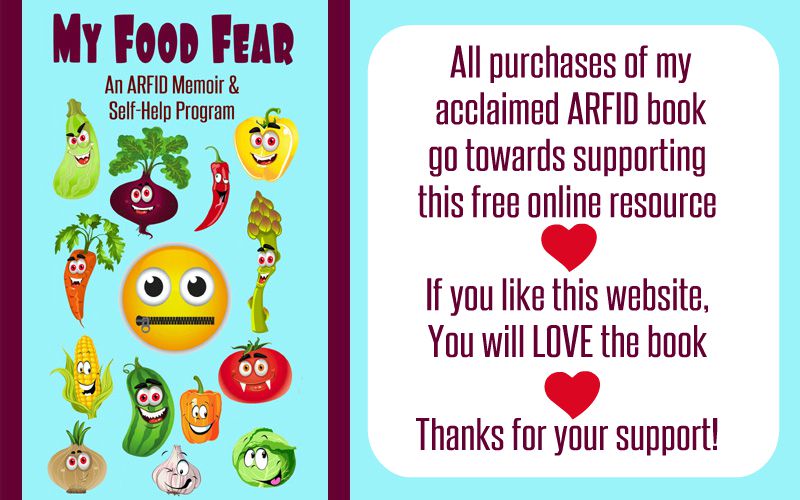ARFID self-help methods can be very effective for people who want to change their selective eating habits. Many people can improve or even resolve their avoidant restrictive food intake disorder without professional help. However, one must desire to do so strongly and have some motivation to succeed in order to optimize their chances for a positive outcome.
I am a firm believer in self-help practices for all problems in life. There is nothing at all wrong with finding help outside of oneself. However, when you can help yourself, you will save time, save money, best control the outcome and gain incredibly valuable skills and experience in the process. It is a real win to be able to overcome any obstacle under your own power.
I used self-help and non-professional methods to overcome an extreme case of ARFID that ruled my life for almost 4 decades. I have also used self-help methods to accomplish most of my victories in life and have written over a dozen books on the topic of influencing your health using proactive self-help practices. In this post, I offer my experience to assist people suffering from ARFID who want to better their eating habits without professional interventions such as psychotherapy or cognitive behavioral therapy.
What is Self-Help for ARFID?
Self-help methods of dealing with any problem involve taking responsibility for yourself, acknowledging and owning the problem, and seeking to rectify it under your own power.
While there is nothing at all wrong with asking for (or requiring) help, there are some great benefits to being able to tackle the issue yourself. I have found that self-help is a great way to grow mentally, physically and spiritually. It is extremely empowering and can teach you life skills that make you capable of handling virtually any obstacle over time.

When it comes to avoidant restrictive food intake disorder, it is possible to improve eating habits and even completely resolve the problem. I have met many people who were determined to overcome ARFID and did just that. They put their mind to the task, followed a plan and succeeded. It is awesome! I also know that is is 100% possible to cure ARFID without seeking professional help, since I did it myself after suffering from extreme selective eating disorder for almost 4 decades.
ARFID Self-Help Requirements
In my experience, the most important factor in determining who has a good chance of succeeding using ANY type of treatment for ARFID is motivation. If a person sincerely WANTS to change and has motivation to change, then the odds of them succeeding increase. If a person feels pressured into seeking help and is quite comfortable with who they are and how they eat, then the odds of them succeeding are very, very low. It really is that simple.
There are some excellent professional programs available to people who suffer from eating disorders, like ARFID. There are some amazing professionals across several vocations who can help people to eat better and even enjoy food. However, none of these tools will be useful if a person DOES NOT want to change. Self-help practices are certainly no exception to this rule. In fact, they exemplify it!
Personal attributes that will help an ARFID sufferer to overcome their eating issues include patience, objectivity, knowledge of health and determination. Since all people with ARFID already have detrimental personality traits that negative influence success rate in treatment (stubbornness, inflexibility, fearfulness, anxiety, compulsive nature), people who do want to change will have to work hard in order to enjoy satisfying outcomes from any form of treatment, be it self-help or professional intervention. Anyone CAN succeed. They just have to work at it and NOT GIVE UP.
ARFID Self-Help Experiences
I cured ARFID after suffering from the age of 2 until 37. My cure took quite a bit of time, but it has not only lasted, but actually provided me with a completely new perspective on life and food. I went from being an introverted, socially-anxious eater to becoming a world traveler and culinary daredevil in the course of several years. My case of avoidant restrictive food intake disorder was as bad as any I have ever seen. Therefore, I know for sure that anyone can improve their eating habits with time and effort. No one is hopeless, even if you feel that way…
I know that the hardest part of overcoming ARFID is starting to try… I never had any real motivation to change and therefore I didn’t. It wasn’t until my life circumstances changed and I suddenly had both opportunity and desire to change that my transformation into a relatively “normal eater” took place. Even with the help I received, it was still a very difficult process to cure my ARFID condition and eat normally. Therefore, I give credit to anyone who has been able to achieve similar results. It is never an easy undertaking!
Whatever path towards eating better you decide upon, I wish you all the luck in the world. I hope you succeed! I write all about my own humorous ARFID story in my acclaimed book My Food Fear. I also completely explain how I managed to cure my eating disorder using practices that literally changed my life in the most amazing ways! I am a much happier person now and can actually eat normally! It has been a fantastic gift to me and my family!

Leave a Reply
You must be logged in to post a comment.